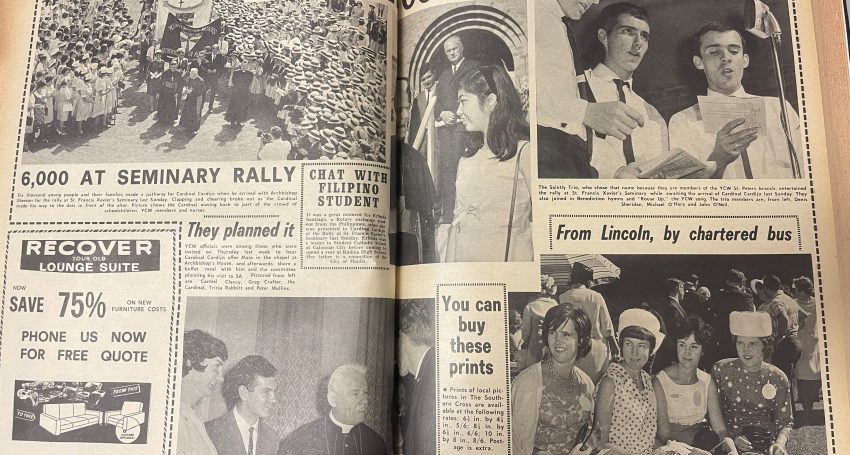Keeping Christian values relevant
Opinion
In the many interviews I have conducted for The Southern Cross, I have always been amazed by how many of the interviewees have told me that they were involved in the Young Christian Workers (YCW) movement in their younger days.

Some of these YCW members went on to be prominent lay leaders in the Church, others became highly regarded experts in their chosen field. I would say all of them were heavily influenced by their involvement in YCW in some way, whether it be through their work life or their own personal faith journey.
In the 100th year of the movement founded by Belgian priest and later cardinal, Joseph Cardijn (1882-1967), it is worth pondering why the YCW was so appealing to young people.
At its peak, the YCW is estimated to have had millions of members worldwide, with tens of thousands joining the movement in Australia in the 1950s and ‘60s. When Cardijn visited Adelaide in 1966 more than 6000 young people turned out for a rally at St Francis Xavier seminary (see The Southern Cross coverage above).
Clearly, they were inspired by Cardijn’s passionate advocacy for the rights of young workers, although the social and sporting aspects of the movement were perhaps equally attractive.
There is a plethora of information on Cardijn online – even YouTube recordings of him speaking – so I decided to experiment and use AI (Artificial Intelligence) to summarise Cardijn’s appeal. Google AI came up with the following:
Emphasis on the dignity of the young worker: Cardijn believed that every young worker was created with a divine destiny and possessed inherent worth, regardless of their social or economic standing. This message empowered young people to see themselves as valuable and capable of contributing to society.
‘See, Judge, Act’ method: This practical approach encouraged critical thinking and action. It empowered young people to analyse their circumstances, make informed decisions and take concrete steps to improve their lives and communities. It shifted the focus from passive acceptance of their situation to active participation in shaping their world.
Social justice advocacy: Cardijn’s work was rooted in a deep concern for social justice. He recognised the challenges faced by young workers in the industrialising world and advocated for fair working conditions, decent wages and access to education and opportunities.
Lay apostolate focus: Cardijn’s vision extended beyond religious life, emphasising the importance of the lay apostolate in building a more just and equitable world. He encouraged young people to see their work as a form of service to God and others, actively contributing to the betterment of society.
Google AI also mentioned his charismatic leadership and his courage – during World War I he was twice imprisoned for so-called patriotic activities and in 1940 the Gestapo arrested him, but released him from jail in September 1942.
But most importantly – and back to my own words – he made the Church relevant to young people’s lives, something that is lacking today.
Pope Leo XIV seemed to acknowledge this when he decided to speak about AI just a few days after he was elected, following Pope Francis’ consistent call to read the signs of the times.
Explaining his choice of name, the new Pope said he identified with the late Leo XIII, who had defended workers’ rights during his 1878-1903 papacy at the dawn of the industrial age, adding that “social teaching” was needed in response to the modern-day revolution brought by AI.
Pope Leo backed up his comments on AI recently in his message to the Second Annual Rome Conference on Artificial Intelligence. He acknowledged that while AI opened new horizons on many different levels, it also raised “troubling questions on its possible repercussions on humanity’s openness to truth and beauty, on our distinctive ability to grasp and process reality”.
Pope Leo spoke of the need to protect human dignity and enable young people to develop their God-given gifts and capabilities. Sound familiar? Just as Cardijn found a place in the factories of Europe to promote Christian values, Pope Leo is meeting young people where they are at – in a rapidly changing and highly complex workplace.
The challenge for the Church is to put Christian values back into social justice.
Many of our Catholic school students have demonstrated strong interest in social justice issues but don’t necessarily see them as being connected to their faith. And when they leave school there are plenty of other avenues outside of the Church for them to advocate for the environment, the homeless or refugees.
As a Church we need to get better at explaining why social justice is integral to who we are as Christians and providing ways for young people to connect with their faith in their daily lives, just as the YCW movement did.
If all else fails, we could always ask ChatGPT or Google AI how to do this today.









